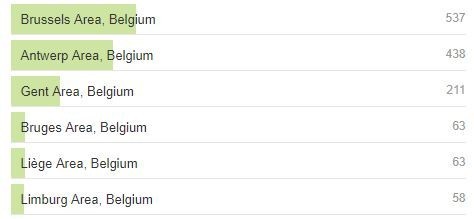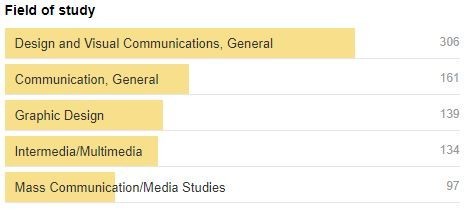The state of UX in Belgium
Back to overview-
Digital Marketing
Digital has become an unstoppable hurricane disrupting business sectors or complete industries along its way. Adapt or die. Having the right people at the right place is the success factor of digital transformation. How is the UX job market in Belgium? I see some clear trends in our industry, insights come directly from my experience as UX Recruiter by taking a daily pulse of the market, here the findings.
We are taking giant steps into a new digital age (a new era where big data, internet of things, blockchain, artificial intelligence, Virtual and Augmented Reality are increa-singly becoming a part of our daily lives). We may not even realize it but technology is not only changing the way humans interact with electronic devices but also human-to-human interactions. In one sentence:
"Technology is reshaping our brains"
Jeremy Cherry
Companies are evolving in parallel to new technology developments, adapting more human centric business models, finding new ways to attract new customers and generate higher revenues. We can already notice the impact in some industries: Retail shopping, Telecommunications and Banking. If you are curious and would like to know more I recommend you read "Top 10 trends for Digital Transformation in 2018 - Forbes" (Daniel Newman, 2017).
With that in mind, companies are designing from a customer-centric and data driven perspective. They are building simple, fast, intuitives, personalized and enjoyable experiences.
How is this translated into direct consequences in the Belgian digital labour market?
We detected two main trends. On one hand, we are seeing an increasing amount of digital experts looking towards consultancy roles as a way to increase their earnings whilst at the same time regaining control over how to best use their time.
Digital-centric companies have been a pioneer in this area and it comes as no surprise that a growing amount of people are looking for greater flexibility when it comes to signing a contract.
On the other hand, this demanded flexibility brings companies into a difficult situation since they rely on the people, they want to retain talent, know-ledge, and they offer competitive salary packages with increasingly better possibilities to improve work-life balance.
What's the status of the Job Market for UX Designers in Belgium?
It is difficult to be 100% secure on the size of the UX Market. When it comes to UX job titles there is a very rich diversity of names, this might be due to misconceptions but there are as many job titles and job content specifi- cations in UX as companies exist.
Disclosure: In order to offer interesting insights in this article, I have conducted several searches on Linkedin Recruiter for which I have only considered professionals who are located in Belgium today and they have or had on their job titles the terms “ux” OR “user experience". This offers a total pool of 1.5K UXers.
The freelance UX sector is becoming an increasing presence in the digital economy. E.g. UX experts made up just 8% of respondents in the freelance section of Ariad salary survey in 2015. This number increased to 21% in this year’s edition showing a marked increase in the growth of the sector and their importance to companies as they become increasingly aware of the need to adapt to the realities of the digital economy.
Are companies struggling to find the right UX talent?
The answer is yes. There is a scarcity of UX profiles in the market and the competition is fierce. Some UXers state that via Linkedin they receive from 3 to 10 commercial inmails from recruiters in a week.
I understand this is not healthy for the recruitment industry, specially when those email request are not relevant at all. I hear frequent complaints about this and that is why I believe more in building long-term relationships with my connections, the real power is in your network.
Companies are really taking into consideration the added value of good User Experience and the ROI that brings at the end of the year (higher market share, better customer retention, lower cost of customer acqui-sition...) and as a consequence there is a trend of internalization and building up in-house UX teams. This does not mean that Digital Agencies are losing their position in the market, but they have to adapt to new ways of collaborating with big corporations.
It is important to note that the internalization of UX teams is a double edged sword, it is a very positive signal of the accelerated empowerment of UX across organizations but it also implies an important extra cost of timing and opportunity. (It needs lot of effort and time to build an internal team and a Design culture & mindset).
Where are the UXers based?
The most of UXers are located in the Flemish Diamond. There is no big surprises here since the results match with the four biggest metropolitan areas in Belgium (Brussels, Antwerp, Ghent and Leuven), places where the biggest companies have their headquarters.

What are the most common academic backgrounds?
There is not a clear academic background for UX designers in Belgium. UX Designers have a multidisciplinary professional career history and most of the times involves a long process of self-teaching. A good design degree (ideally in Human-Computer interaction) will help to have great knowledge on the fundamentals of UX but only a good amount of professional experience will make you to stand out.

In case you would like to develop your skills in UX Design but do not know where to start, there are plenty of short-term UX classes and bootcamps where you will tackle real projects, this way you can start your first portfolio cases (Nielsen Norman Group, General Assembly, Lynda.com, Interaction Design Foundation ...).
How big is the gap between talent and leading companies in the Belgian market?

70% of UX Designers have 6 or more years of experience in the design industry. This may seems logical since we can agree on the fact that some years of experience and business acumen are needed before becoming a UX Designer.
Also, it is interesting that almost the 53% on this sample are only in their current positions for less than a year or 1 to 2 years, this sign perhaps reflects that companies are very much still utilizing UX designers on a project by project basis.
On the other hand, there is a lack of junior profiles in the market (1 to 3 years of experience) probably hidden behind other job titles as most UX Designers have previous experiences at the beginning of their careers as Web, Visual, Graphic Designers and other creative backgrounds.
What are the top UX employers in Belgium?

Big banks are the kings of UX (KBC Bank, BNP Paribas Fortis, Belfius & ING). Banking breaths digital, the banking landscape is more dynamic than ever before due to the high pressure coming from challenger banks and fintechs start-ups, see the good examples of Monzo, Revolut, N26 and many others.
Special mention to Proximus who is on top of the ranking as well as the European Commission and the big variety of Digital Agencies providing consultancy services.
Conclusions and takeaways
- Innovative companies are adapting more human-centric business models, personalization of the experiences is Key and also they are more flexible towards the type of employment and work/life balance.
- There is a clear trend towards consultancy and freelance type of work.
- UX Designers appreciate variety of projects/assignments rather than focusing on a single project for several years.
- There is no academic background that ensures a brilliant career in UX.
- Design landscape is getting more competitive. There is a trend to shift from UX to Product Design so designers need to understand more about business strategy.
- The UX market in Belgium is very competitive.
- There is a trend of internalization and building up in-house UX teams at big companies.
- There is a natural generational gap between Senior Designers with excellent knowledge about the industry and business and experienced working for big corporations vs Junior but very ambitious Designers that master the latest tools and prefer working for modern Digital Agencies.
- The 4 biggest banks in Belgium are leading employers for UX professionals.
Dear reader, I hope you found the article interesting. Are there any big surprises? Do you have a different point of view?
Do not hesitate to exchange your impressions and contact me!




